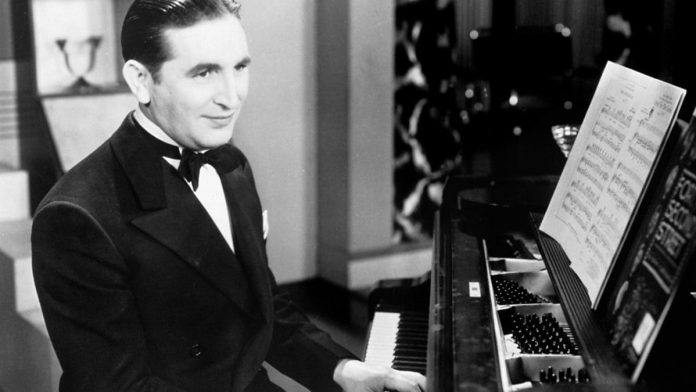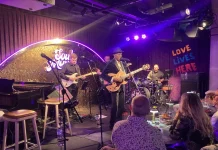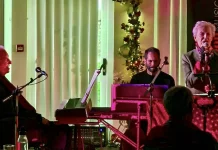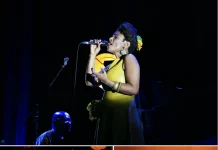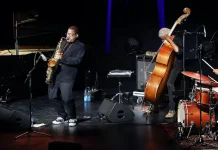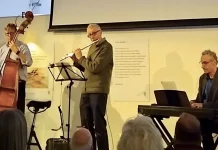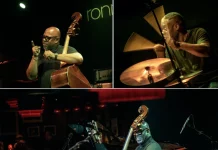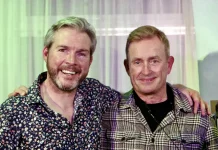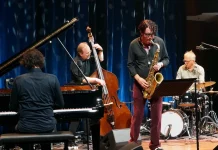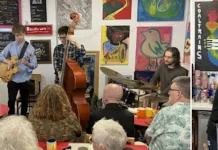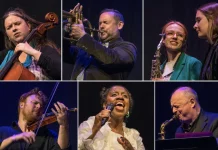With Chris Ingham’s last live stream from his Suffolk living room I ventured to speculate that it may have been the last in a very entertaining series. As you can see I was wrong but now he has a booking at Crazy Coqs in a few weeks time so it may be that this evening of songs by Salvatore Antonio Guaragna may be the real swan song.
Guaragna senior anglicised the family name to Warren and Sal completed the job by becoming Harry and embarking on a successful career on Broadway in the 1920s. It was a source of bitterness for Warren’s entire life that he was virtually anonymous despite writing more hits than Irving Berlin (which included no less than three Best Song Academy Awards from 11 nominations between 1935-1957). Many think of him only as a Hollywood songwriter and tend to date the start of his career from the film 42nd Street in 1933 when in fact he was active in New York a full decade prior to that.
Chris began the first set with four of these East Coast numbers, starting with Home In Pasadena, written in 1923 and revived successfully by The Temperance Seven nearly four decades years later. This was followed by Nagasaki, one of the “novelty” songs that epitomised the 1920s and then a couple of ballads that may have been a tad ahead of their time – I Found A Million Dollar Baby (In A Five A Ten Cent Store), and You’re My Ev’rything.
It was then, in the early 30s, that the movies came calling in the shape of Warner Brothers. Since the advent of the soundtrack in 1927 there had been a first wave of musicals with which the audience had quickly become sated and now, in 1933, it was ripe for a fresh take on the formula. A young man named Busby Berkeley was ready for the challenge. Warners teamed Warren with veteran lyricist (Tiptoe Through The Tulips) Al Dubin and paired both with Berkeley on 42nd Street, which, despite having only four numbers, single-handedly revived the Hollywood musical. Chris featured two of the four numbers, Shuffle Off To Buffalo and the title song. Warren and Dubin remained at Warners through the bulk of the 30s working frequently with Berkeley plus actors like Dick Powell, Ruby Keeler and Joan Blondell. Chris gave us another five numbers to close the first set – Remember My Forgotten Man, Keep Young And Beautiful, We’re In The Money, With Plenty Of Money And You and – the first of Warren’s three Oscar winners – Lullaby Of Broadway.
Given that Warren spent time at four major studios – Warners, Fox, MGM, and Paramount – theoretically the second set should take up the story with his years at Fox but Chris began with four further numbers from Warners – I’ll String Along With You, September In The Rain, Jeepers Creepers – which Louis Armstrong sang to a horse in Going Places – and You Must Have Been A Beautiful Baby.
Producers have never been celebrated for sensitivity and despite the high quality Warren and Dubin were turning out they brought in a second lyricist, Johnny Mercer, no less, to help out. Dubin, not unnaturally, viewed this as a slight and walked. Slightly later he drank himself to death and Warren moved to Fox where he was teamed with yet another veteran lyricist, Mack Gordon (Stay As Sweet As You Are).
Glenn Miller made only two feature films before his untimely death; both were for Fox and both had scores by Warren and Gordon. Between them Sun Valley Serenade and Orchestra Wives yielded a bagful of hits and Chris weighed in with Chattanooga Choo Choo, Serenade In Blue and At Last – this was damaged irreparably by Etta James and Chris reminds us how it sounded originally. Fox had its own roster of “musical” stars – Don Ameche, Tyrone Power, Alice Faye, Betty Grable, Dick Haymes and Alice Faye and it was the latter who sang No Love, No Nothing in The Gang’s All Here and You’ll Never Know (Warren’s second Oscar winner) in Hello, Frisco, Hello. Chris offered both, together with Dick Haymes’ big ballad from Diamond Horseshoe, The More I See You.
Warren next found himself at MGM where he re-teamed with Johnny Mercer for his third Oscar Winner, The Aitchison, Topka And The Santa Fe which Judy Garland belted out to a fare-thee-well in The Harvey Girls. While at MGM he also collaborated with Arthur Freed on This Heart Of Mine, which Fred Astaire performed in Zeigfeld Follies. He also worked with Ralph Blane on a Mickey Rooney vehicle Summer Holiday – no connection with the Cliff Richard movie with the same title. This was an adaptation of Eugene O’Neill’s only comedy Ah! Wilderness and one song was performed by Walter Huston which clearly had overtones of September Song. Spring Isn’t Ev’rything was Warren’s favourite of all his songs and he was bitterly upset when it was cut before the film was released. Chris weighed in with a sympathetic reading.
Warren worked at only one more major studio, Paramount, and provided Dean Martin with a signature song That’s Amore which was featured in the Martin and Lewis vehicle The Caddy. In the late 50s most of the heavy hitters – Porter, Berlin, Kern, Gershwin – were either dead or had thrown in the towel. Warren clung on for a while writing mostly title songs for movies. One of my own favourites was sung by Vic Damone over the opening credits of Separate Tables but Chris ended his evening of Warren memories with the title song from An Affair To Remember, a strong melody with a ho-hum lyric. This was yet another evening of splendid entertainment from a fine singer, pianist and raconteur.

